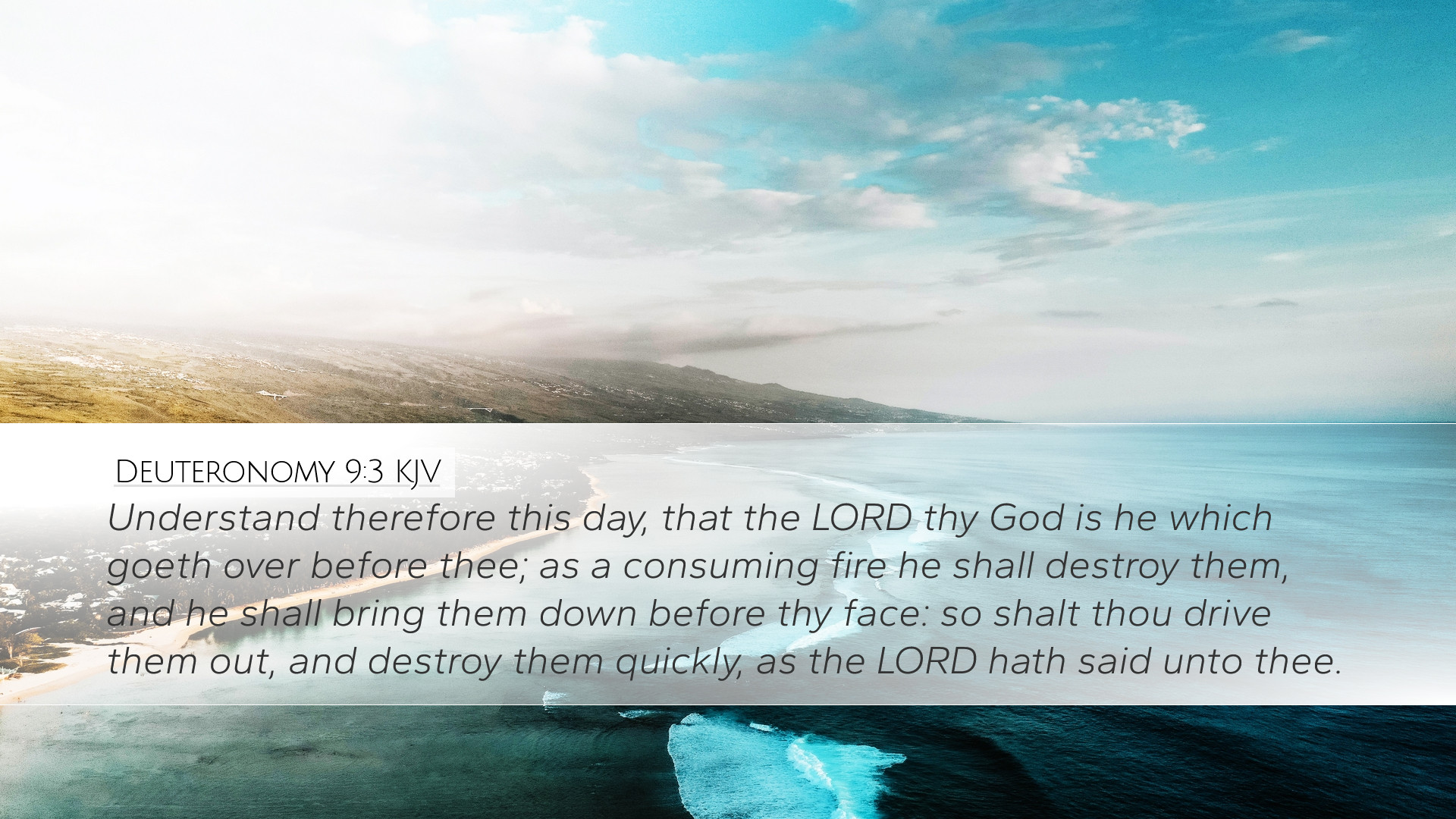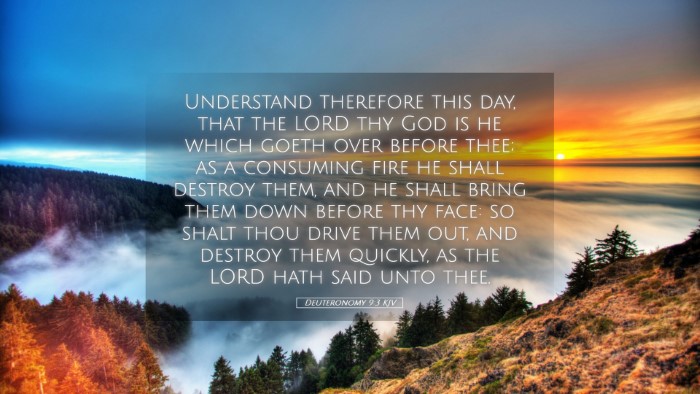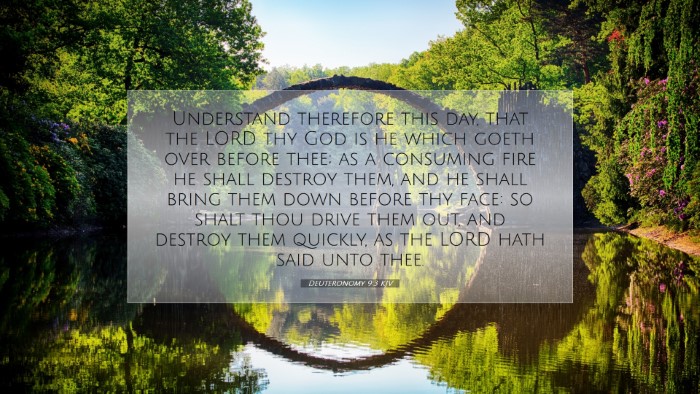Commentary on Deuteronomy 9:3
Verse: "Understand therefore this day, that the Lord thy God is he which goeth over before thee; as a consuming fire he shall destroy them, and he shall bring them down before thy face: so shalt thou drive them out, and destroy them quickly, as the Lord hath said unto thee."
Introduction
Deuteronomy 9:3 stands as a pillar of reassurance and warning as Moses delivers his final addresses to the Israelites before they enter the Promised Land. The verse encompasses themes of divine assistance, judgment, and the required obedience from God's people. In this exegesis, we will draw upon the insights of notable public domain commentators such as Matthew Henry, Albert Barnes, and Adam Clarke to unpack the profound implications of this scripture for pastors, theologians, and students of the Word.
Contextual Background
The book of Deuteronomy is essentially a series of speeches by Moses, intended to remind the Israelites of their covenant with God and to prepare them for life in the Promised Land. By the time we reach chapter nine, the Israelites are poised to encounter the daunting task of overcoming powerful nations. Understanding the historical and cultural context enhances the significance of this verse.
Exegesis of Deuteronomy 9:3
This verse can be broken down into key components that reflect God's nature and His relationship with His people:
- Recognition of Divine Presence: "Understand therefore this day"
- The Nature of God as a Warrior: "the Lord thy God is he which goeth over before thee"
- Judgment Against Enemies: "as a consuming fire he shall destroy them"
- Empowerment of God's People: "so shalt thou drive them out"
1. Recognition of Divine Presence
Moses calls on the Israelites to understand and acknowledge that God is actively present among them. Matthew Henry emphasizes that recognizing the divine is crucial for fostering faith and courage among the people. Clarke elaborates that awareness of God’s guidance promotes confidence as they face their enemies.
2. God as a Consuming Fire
The imagery of “consuming fire” serves as a dual reminder of both God's holiness and His destructive power against the enemies of Israel. Albert Barnes notes that fire signifies purity, judgment, and the intensity of God’s might. The consuming fire represents God's zeal for His people and His determination to eradicate sin and opposition from the land.
3. Judgment Against Enemies
The adversarial nations are not simply obstacles but are subjects of divine judgment. Henry points out that their impending destruction is not solely for Israel's sake but also a reflection of God's righteous judgment against those who oppose Him. This theme of divine retribution is woven throughout Scripture, illustrating that God's patience has limits and His judgment is true.
4. Empowerment of God's People
God’s assurance that the Israelites will drive out the inhabitants encourages active participation in their victory. Clarke stresses that while God prepares the way, the Israelites must still engage in the battle. This reflects the partnership between divine sovereignty and human responsibility—an essential doctrine for both pastoral ministry and theological education.
Theological Implications
Deuteronomy 9:3 provides rich theological insights that can guide spiritual leaders and scholars alike:
- The Sovereignty of God: God's preeminence is affirmed as He goes before His people and orchestrates their victories.
- Human Agency: The call to action compels believers to participate in the fulfillment of God's promises through obedience.
- Holiness of God: The consuming fire symbolizes God's nature, which should invoke reverence in the hearts of those who follow Him.
- God’s Faithfulness: God’s commitment to fulfill His covenant reassures believers of His presence in times of struggle.
Practical Applications
The insights drawn from Deuteronomy 9:3 can be applied in several contemporary contexts:
- Encouragement in Leadership: Leaders can take heart knowing that God goes before them in their trials, whether in church, community, or personal life.
- Faith in Divine Intervention: In daunting situations, believers should be reassured of God’s consuming fire that fights on their behalf.
- Call to Holiness: Understanding God’s nature compels followers to pursue holiness and reflect His character in their lives.
- Active Participation in God’s Work: Believers are called to cooperate with God in His missions on Earth, realizing they are instruments in His hands.
Conclusion
Deuteronomy 9:3 encapsulates a powerful message that reverberates through time—God is actively involved in the lives of His people. By breaking down this verse through the lenses of historical context and theological reflection, we gain profound insights into God’s nature, His promises, and our response to Him. We are encouraged to memorize and meditate upon such verses that remind us of the weightiness of God’s character and the action He expects from us as faithful followers.


